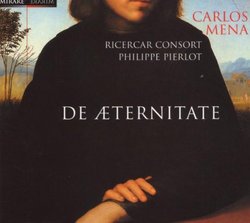| All Artists: Johann Christoph Bach, Christoph Bernhard, Christian Geist, Johann Michael Bach, Johann Adam Reincken, Nikolaus Hasse, Johann Fischer, Christian Spahn, Melchior Hoffmann, Philippe Pierlot, Carlos Mena, Ricercar Consort Title: De �ternitate Members Wishing: 0 Total Copies: 0 Label: Mirare France Release Date: 3/9/2004 Album Type: Import Genres: Pop, Classical Styles: Vocal Pop, Opera & Classical Vocal, Forms & Genres, Concertos, Sonatas, Historical Periods, Baroque (c.1600-1750) Number of Discs: 1 SwapaCD Credits: 1 |
Search - Johann Christoph Bach, Christoph Bernhard, Christian Geist :: De �ternitate
 | Johann Christoph Bach, Christoph Bernhard, Christian Geist De �ternitate Genres: Pop, Classical
|
Larger Image |
CD Details |
CD ReviewsA voice teacher and early music fan George Peabody | Planet Earth | 10/29/2006 (5 out of 5 stars) "LAMENTATIONS SUIT MENA'S VOICE TO A 'T'.
From the beginning of time songs of mourning, sorrow and lamentation have been a part of Western music. Aristotle had written that nothing was more powerful than rhythm and song for imitating all the turmoil of the soul. Composers of the Baroque Period strove to deal with nothingness and eternity by exploring the utter depths of the heart. And this is what these songs are all about. Johann Christian Bach was an uncle of Johann Sebastian Bach and an excellent musician. His Lamento:"Ach dass ich Wassers g'nug hatte" is a short piece in 3 sections with a Da capo. It is a contrite prayer in which the Christian, weeps over his sins and fears divine wrath. The Cantata "Was betrubst du dich" by Christoph Bernhard(a leading pupil of Schutz) has a text taken from Psalm 42. Christian Geist's "O Traurgkeit" written for Passiontide is an intensely expressive piece in which the music is totally subservient to the text. Johann Christoph Bach wrote only 5 cantatas, one of which was "Ach wie sehnlich wart' ich der Zeit"; it is a restrained,melancholic evocation of the Christian desirous of meeting Christ, the consoler. Johnn Adam Reincken was one of the greatest organists in Northern Germany. From his volume of instrumental suites "Hortus musicus" we have a church sonata combined with dance movements. Little is known of Nicolaus Hasse and Christian Spahn whose "Letzie Sterbensworte" shows him to be faithful to the tradition of the lamentation played on the viol. The 5 strophes of Hasse's "Von der Ewigkeit" contain lines of great purity, though the conclusion is more lively. Johann Fischer played an important role in the expansion of French influence in Germany. His cantata "Klag-Gedicht" is an evocation of a Christian's death and resurrection. The Cantata "Schlage doch" attributed to Georg Michael Hoffman consists of only one aria, but its moving expression is equalled by a vocal line close to the style of the 'aria da capo' from Italian opera. This work has been recorded by several countertenors. The voice of Carlos Mena (countertenor) is very satisfying to hear; it is deep, clear and sonorous. He sings skillfully and with much emotion and depth. He is not my favorite countertenor, but this disc is lovely and the Ricercar Consort under the direction of Philippe Pierlot is top-notch. This is my favorite work on the disc." |

 Track Listings (10) - Disc #1
Track Listings (10) - Disc #1